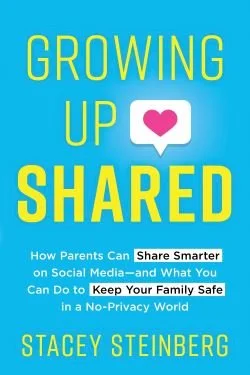What Grandparents Need to Know About Social Media Safety
You try to do everything you can to keep your grandchildren safe.
You pay attention to the way they sleep, make sure the car seat is installed correctly, and carefully cut every grape into quarters. But there are dangers in the world that go beyond the physical—and one is a danger that didn’t exist when your own children were young. If you are one of the 75% of grandparents who uses social media, you may be endangering your grandchildren in a way you never considered.
Facebook and Instagram have replaced the pictures of their grandchildren that grandmothers used to carry. Now instead of pulling out their wallet to show off the latest snapshots, grandparents share those photos with their friends on social media. And even if they are very careful with their privacy settings, they are also sharing them with the world. That’s why some parents ask that you don’t share any images at all.
Any photo posted publicly can be used by anyone for anything. Even photos posted privately can still end up being shared more widely than the poster intended. The cute picture you just shared with close friends on a private page? Any one of those friends could take a screenshot or download it and share it however they wish, usually with the best of intentions.
Worse, there are people who do not have the best intentions.
If you’d like to learn more about the challenges parents are facing online, Steinberg's book is both fascinating and informative. Buy it now on Amazon.
In her book, Growing Up Shared, Stacey Steinberg cites a study that says it is common for photos of children doing "normal" things to be shared on pedophile websites. A second study concludes that half of those images are taken from social media and family blogs. And worse, technology makes it possible to take those innocent photos and morph them into highly disturbing pornography. However, she emphasizes that there is no real evidence of how often this happens.
The important thing here is to know that the risk exists, and then have a conversation with your grandchildren's parents about whether that risk is one that concerns them. Some parents don't worry about it any more than other bad things, like credit card fraud. Others see it as too big of a risk to post any photos at all, and ask that you don’t share any images, either. They aren’t being unreasonable: they want to be able to control their child’s online presence.
If their risk tolerance is lower than yours, follow their lead without trying to change their view.
If their risk tolerance is higher than yours, you can decide what to post based on your own assessment of what is safe. Don't feel you need to change their mind if they are less worried than you are. Though you might buy them a copy of Steinberg's book, which does an excellent job discussing the issues surrounding this generation without passing judgement. (In fact, I highly recommend reading it yourself and then passing it along!)
But it’s not just the photos that are shared that can be misused—it’s the information that goes with them.
Social media birth announcements often share too much PII.
A million children in the US were victims of identity theft in 2017. Too many grandparents post photos on social media with information that exposes their children and grandchildren to identity theft and hackers. Personally identifiable information (PII) should be treated like gold, and yet every day there are public social media posts announcing the birth of a baby with full name and birthdate mentioned. Many of these posts make it easy to figure out birthplace and mother’s maiden name, too. That proud and unsuspecting grandparent has just handed a potential identity thief four of the most useful pieces of information they could want. Even with your privacy settings set as securely as possible, nothing that is posted on the internet is truly secure.
Our grandchildren are the first generation of children to grow up with social media since birth. Unlike most aspects of being a parent or grandparent, there is no collective wisdom guiding us on how to navigate the ability to share every moment of these children's lives. It's up to each of us to educate ourselves and safeguard our grandchildren.
Whether it’s unthinkingly sharing personally identifiable information or posting an awkward picture of them that will embarrass them they are older, your social media habits can affect your grandchildren for life. Here are six important tips for protecting them when you use social media:
1. Ask Permission
Some parents are happy to let you post photos of their children, others are not. Make sure you find out what the parents of young children are comfortable with you sharing, and ask older kids themselves, as well.
2. Check Your Privacy Settings
Use the strictest privacy settings you can to keep pictures of your grands from being available to the entire world. In fact, go check your settings as soon as you finish reading these tips.
3. Don’t Share PII
Personally Identifiable Information, or PII, is valuable to hackers and identity thieves. Posting a new grandbaby's full name and birthdate gives an identity thief all the info they need to get started.
4. Make a Close Friends List
Facebook and Instagram both allow you to set up a list of close friends. This allows you to share selected posts with a small group of trusted people.
5. Think Twice
Even with your account set to private, always ask yourself if a picture you are about to post is one your grandchild would want the whole world to see. Anything posted on social media lives forever.
6. Check Your Privacy Settings
Yes, check them again. Social media platforms are constantly changing the way they handle your information, and new privacy settings are regularly added. Set a reminder to check your settings at least twice a year.
These dangers aren’t confined to any one social media platform. Whether you use Instagram, Facebook, TikTok, Twitter, Snapchat, Reddit, LinkedIn, or any of the other sites that may be out there, the dangers are the same. That’s the bad news.
The good news? Now you know how to protect your grandchildren from those dangers.




